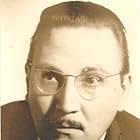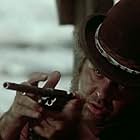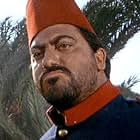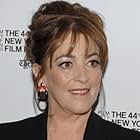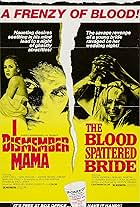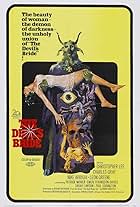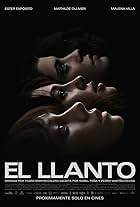A female vampire rises from her crypt every night in search of children as her victims.A female vampire rises from her crypt every night in search of children as her victims.A female vampire rises from her crypt every night in search of children as her victims.
José María Prada
- L'homme Mystérieux
- (as José Mª Prada)
José María Caffarel
- Le Médecin
- (as José Mª Caffarel)
Featured reviews
The combination of "slow," "arthouse," "surreal" and "horror" is very appealing to me, so it was disappointing upon finally seeing this mid-70s flop to find out that it does actually deserve its rep as something of a lifeless slog. The problem isn't the lack of overt "horror" content (at least that's not a problem for me), though if you're expecting more, it will no doubt be disappointing that Ullmann's quasi-vampiric slayings of children are no more explicit than her enfolding them in her cloak. But the film simply lacks style and atmosphere, as well as verve, so the human aspects are as limp as the supernatural ones.
We only meet Leonor on her deathbed, so we get no sense of her (before her revival from the dead), or the Piccoli character's supposed great love for her. It's a bit hard to believe in the latter, as the very day she's buried he demands to marry young Ornella Muti, to the bafflement of her, her father, and the viewer. Nor does he express any notable emotions (beyond eventual impatience and hostility) towards his new bride, either. Ergo we feel nothing about the passion that supposedly leads him to resurrect one wife and neglect, then destroy another. He's a selfish, combative, unappealing character. That element might have provided its own social commentary, but the film doesn't seem to be saying anything in particular with it. The two women are beautiful, but their considerable acting skills are put to little use here. (Nor does it help that both are dubbed by others in the English language version I saw--it's particularly weird to be deprived Ullmann's familiar voice.)
The film is not so much badly as indifferently made, which is odd considering the director's pedigree (and the fact that it was his debut feature). It's watchable, but stubbornly refuses to become hypnotic, frightening, insightful, or any of the other things you might hope for. I saw the longer original cut, presuming it would be better than the shorter (by about 15 minutes) U.S. version, which was very poorly received. But I suspect the shorter edit simply made the story less comprehensible, without making it any livelier, and the long version isn't exactly dull, just very flat. If a director with more visual and atmospheric flair, say anyone from Bava to Herzog, had made this around the same time, it might have turned out brilliantly. But the best you can say about Juan Bunuel's handling is that it is technically competent if uninspired--not what you want from a film about a love that defies death itself.
We only meet Leonor on her deathbed, so we get no sense of her (before her revival from the dead), or the Piccoli character's supposed great love for her. It's a bit hard to believe in the latter, as the very day she's buried he demands to marry young Ornella Muti, to the bafflement of her, her father, and the viewer. Nor does he express any notable emotions (beyond eventual impatience and hostility) towards his new bride, either. Ergo we feel nothing about the passion that supposedly leads him to resurrect one wife and neglect, then destroy another. He's a selfish, combative, unappealing character. That element might have provided its own social commentary, but the film doesn't seem to be saying anything in particular with it. The two women are beautiful, but their considerable acting skills are put to little use here. (Nor does it help that both are dubbed by others in the English language version I saw--it's particularly weird to be deprived Ullmann's familiar voice.)
The film is not so much badly as indifferently made, which is odd considering the director's pedigree (and the fact that it was his debut feature). It's watchable, but stubbornly refuses to become hypnotic, frightening, insightful, or any of the other things you might hope for. I saw the longer original cut, presuming it would be better than the shorter (by about 15 minutes) U.S. version, which was very poorly received. But I suspect the shorter edit simply made the story less comprehensible, without making it any livelier, and the long version isn't exactly dull, just very flat. If a director with more visual and atmospheric flair, say anyone from Bava to Herzog, had made this around the same time, it might have turned out brilliantly. But the best you can say about Juan Bunuel's handling is that it is technically competent if uninspired--not what you want from a film about a love that defies death itself.
Although not strictly a vampire film, this is one of those interesting European combinations of horror and art, typified by "Daughters of Darkness" in the 70's or "Let the Right One In" more recently. The plot involves a a 14th century nobleman who loses his young wife (Liv Ullman) to a horseback-riding accident (and to primitive medical practices of the era). He re-marries and has children, but remains mired in grief and unable to forget his first wife (even though his new wife is played by a Ornella Muti, who would make most men forget their own name). Finally, in a kind of "Monkey's Paw" scenario he manages to actually will her back from the grave, but she's not the same, and a lot of local children begin to mysteriously disappear and it isn't long before his new family is threatened. . .
This is more an art film than a horror film, not surprisingly since it was directed by Luis Bunuel's son and features Ingemar Bergman's frequent lead actress and muse. It's more serious than a lot of Euro-horror films, realistically set against the background of the Black Death plague and seriously commenting on the prevailing superstitions of the time (i.e. the fool-hardy medical practices, the witch-burnings). The vampiric element is present mainly in the undead Ullman's predations on peasant children, which recalls the "Bloofer Lady" that the undead Lucy Westeridge becomes in Bram Stoker's original novel "Dracula", an element that has been left out of almost all the subsequent movie adaptations because it't just too disturbing. It's also really quite heartbreaking to see the maternal instinct so corrupted, and to see undying love gone so horribly wrong.
This movie has, unfortunately, kind of fallen through the cracks between art and horror. It is not as exploitative as Jean Rollins sex-and-blood-soaked vampire films, on one hand, but it is not quite as self-consciously arty as something like Ingemar Bergman's "Hour of the Wolf" either (if Bergman or the Bunuel father had simply put their NAME on this movie, it would no doubt be much more well-known today) . It deserves better though. Ulman and Piccolo are very good as the star-cursed lovers, and Ornella Muti is amazing (if WAY too beautiful to be forsaken for a dead woman). It is ripe material for a DVD release.
This is more an art film than a horror film, not surprisingly since it was directed by Luis Bunuel's son and features Ingemar Bergman's frequent lead actress and muse. It's more serious than a lot of Euro-horror films, realistically set against the background of the Black Death plague and seriously commenting on the prevailing superstitions of the time (i.e. the fool-hardy medical practices, the witch-burnings). The vampiric element is present mainly in the undead Ullman's predations on peasant children, which recalls the "Bloofer Lady" that the undead Lucy Westeridge becomes in Bram Stoker's original novel "Dracula", an element that has been left out of almost all the subsequent movie adaptations because it't just too disturbing. It's also really quite heartbreaking to see the maternal instinct so corrupted, and to see undying love gone so horribly wrong.
This movie has, unfortunately, kind of fallen through the cracks between art and horror. It is not as exploitative as Jean Rollins sex-and-blood-soaked vampire films, on one hand, but it is not quite as self-consciously arty as something like Ingemar Bergman's "Hour of the Wolf" either (if Bergman or the Bunuel father had simply put their NAME on this movie, it would no doubt be much more well-known today) . It deserves better though. Ulman and Piccolo are very good as the star-cursed lovers, and Ornella Muti is amazing (if WAY too beautiful to be forsaken for a dead woman). It is ripe material for a DVD release.
If anything, LEONOR is a very Grimm fairy tale of love, loss, sorrow, and horror set in the Middle Ages during the time of the black plague but unfortunately, it's also less than the sum of its parts. Feudal lord Richard (Michel Piccoli), mad with grief over the death of his beloved wife Leonor (Liv Ullman), tries to assuage his torment by marrying a village girl (Ornella Muti) who eventually bears him two sons. Ten years pass but the pain doesn't ease and when Richard gets the chance to bring his lost love back, he takes it. His dream comes true but soon animals can't be tamed, crops won't grow, and children begin disappearing from the village...
Filmed among the mountains and crumbling castles of Spain by Luis Buñuel's writer/director son Juan (who worked mostly in TV after this), LEONOR is a vampiric variation on "The Monkey's Paw" and "could have been a contender" since dark romantic horror can be just as potent as erotic horror in the right hands. The sweeping vistas and medieval tableaux by Dario Argento's SUSPIRIA cinematographer Luciano Tovoli and the moody Ennio Morricone score both serve the story well but the Gothic, Poe-like tale (based on a 19th century work by J. Sheridan Le Fanu contemporary Matthew Gregory Lewis) is slow moving and the horror implied rather than explicit. Both factors work against the film but the casting of Liv Ullman in the role of "Leonor" is the final nail in the coffin, so to speak. Ingmar Bergman's muse may be a very good actress but as someone quipped to Katharine Hepburn when she said she wanted the part of Scarlett O'Hara, "I can't see anyone chasing you for ten years" and if Liv and ravishing Ornella Muti had switched places this would have gotten a 8/10 from me. As is, it's a 7.
Filmed among the mountains and crumbling castles of Spain by Luis Buñuel's writer/director son Juan (who worked mostly in TV after this), LEONOR is a vampiric variation on "The Monkey's Paw" and "could have been a contender" since dark romantic horror can be just as potent as erotic horror in the right hands. The sweeping vistas and medieval tableaux by Dario Argento's SUSPIRIA cinematographer Luciano Tovoli and the moody Ennio Morricone score both serve the story well but the Gothic, Poe-like tale (based on a 19th century work by J. Sheridan Le Fanu contemporary Matthew Gregory Lewis) is slow moving and the horror implied rather than explicit. Both factors work against the film but the casting of Liv Ullman in the role of "Leonor" is the final nail in the coffin, so to speak. Ingmar Bergman's muse may be a very good actress but as someone quipped to Katharine Hepburn when she said she wanted the part of Scarlett O'Hara, "I can't see anyone chasing you for ten years" and if Liv and ravishing Ornella Muti had switched places this would have gotten a 8/10 from me. As is, it's a 7.
Don't expect 70s Eurohorror in the vein of Jess Franco and the like, and don't expect anything ingenious like the efforts of the director's father. It's a loose adaptation of motives by early romanticist Ludwig Tieck, and since there was no vampirism in literature back then, THERE ARE NO VAMPIRES IN THIS MOVIE EITHER! Just Liv Ullman coming back from the dead after 10 years and strangling children. Great locations, good acting, but neither a convincing drama nor a satisfying horror film. But I've seen much worse than that and young Ornella Muti's a treat. And I like the fact that some screenwriters of the seventies got back to classic seldom filmed literature (like Ado Kyrou did in the far superior 'Le Moine') instead of copying plotlines, themes and motives that have been used a thousand times before.
There are no vampires here, the synopsis given here is incorrect. What you get is a devastating film that details a love lost but never forgotten, and what happens when that lost love returns 10 years later resulting in murder, chaos and violence. Even more impressive, the film does not resort to nudity or gore to keep the viewer's attention. The cast is excellent, the script and story are fresh and inventive, and the direction hits all the right notes. Truly a one of a kind horror film, absolutely NOT for the slasher / torture porn crowd. The Magnetic video from 1980 contains the 85 min English dubbed version. The IMDb lists 100 min for the Spanish version, which is set for DVD release in June 2008. The dubbing is above average and nothing seems missing from the 85 min version, but I'm curious about the Spanish DVD when it comes out. This could be the ultimate art house horror!
- How long is Leonor?Powered by Alexa
Details
- Release date
- Countries of origin
- Official site
- Languages
- Also known as
- Leonor, the Devil's Mistress
- Production companies
- See more company credits at IMDbPro
Contribute to this page
Suggest an edit or add missing content













